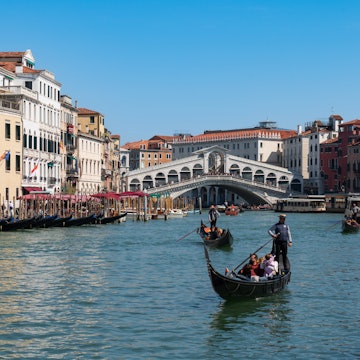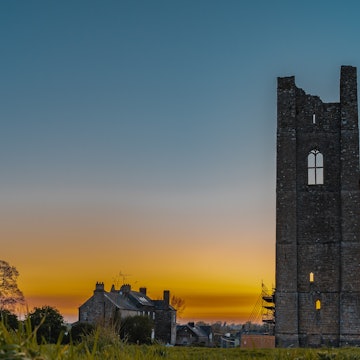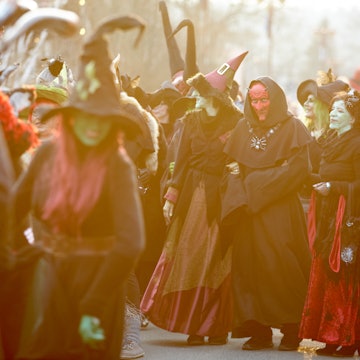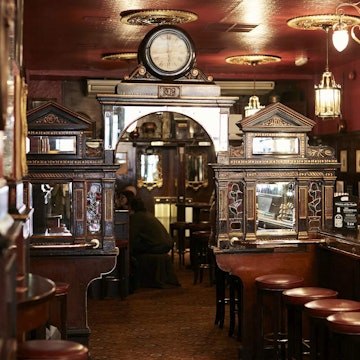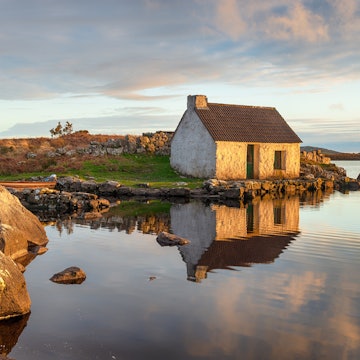
Dublin's ballad-singing tour guide will show you a city you won't forget

Feb 17, 2023 • 6 min read

Balladeer and Dublin tour guide Seán Fitzgerald brings the city’s history to life through music © Peter Cooney
Seán Fitzgerald is a Dublin tour guide like no other. He's the local you always hope to meet - the one with stories and smiles and who knows all the secrets about a place you won't find on the internet. He details Dublin’s hidden histories through ballads and storytelling.
Seán Fitzgerald calls himself a “singing tour guide,” for his part in sharing the somber songs that singers 200 years his senior made famous – songs such as “Wild Geese On the Ocean,” “Whiskey I Adore” and “Biddy Mulligan the Pride of the Coombe.” He's in the city on a Saturday morning to take visitors through the secrets of lesser-known Dublin, through music many will never have heard before.
He chooses his songs – ones even a typical Irish person might not know – to communicate the very core of the Gaelic spirit, using information you won’t find in books. Today he has his mandolin – he likes bringing it on tours because it’s “silly and cheerful” – which he tunes as we walk. He started playing it during lockdown and now brings it on tours in the colder weather. “Violins don’t like the cold,” he explains with a wry smile.
We begin on Grattan Bridge, which separates Capel Street on Dublin’s Northside – home to some of the city’s best Korean restaurants and gay bars – from the quintessentially tourist haunt of Temple Bar. This part of the city is familiar territory for Seán: in addition to leading visitors through the streets that characters like Leopold Bloom and Molly Malone called home, his band regularly plays in the Northside bar . He begins his first tune – “The Waxies’ Dargle” – something he prefaces as linking the two cornerstones of Irish identity: “alcoholism and starvation.”
He cracks a smile.

Tours rarely, if ever, go the same way twice. “If I do the same songs I’ll forget what bits I’ve said or left out,” he says. “You get into a flow when you’re performing, and that usually happens to me when I’m about two or three stops deep. °Őłó˛ąłŮ’s when I come alive.”
A family of balladeers
As a boy, Seán’s mother sang him to sleep. “The best performer I’ve ever seen is still her,” he says. His parents hail from Gaeltacht (or entirely Irish language–speaking) areas West Kerry and Connemara, and met in London (“they bonded over this woman on the train with them whose sandwiches stank”), eventually returning to Ireland. Their passion was always writing – stories and poems – something they passed onto their son, who worked day jobs in construction and laboring “as well as other things I wasn’t good at,” and pursuing music at night.
The idea for the ballad tour came when he began to research forgotten ballads that told the tales of everyday life in Dublin, something he decided told the story of the city in a way no one else was.
Today Seán's powerful and brooding voice can be heard from some distance as he weaves in and out of winding streets, stopping off to share hidden secrets of inner Dublin, and lingering with groups far longer than the allotted time.
Of bells and barmen
Situated along Dublin’s Southside quays, Smock Alley Theatre is the next stop. A facility older than Shakespeare's Globe theatre in London, it was founded in 1662, four years before the Great London Fire. Stories of Oscar Wilde and Joseph Grimaldi and The Importance of Being Earnest flow easily. Here, he takes a small gold bell from the front pocket of his mandolin case. “Do ye want to hear the story of the bell?” he asks with a smile.
How could we not? According to Seán, Dublin was a center of bell production for most of Europe before hydraulics revolutionized pub culture in the 1800s. Prior to tubing and piping, alcohol was served via a pulley system, and brought to the barman’s attention with bells – the majority of which were made on Dublin's Church Street. Clocks, he says, were also big business. “So there you go, bells and clocks – will we head on?”
A five-minute walk south across cobblestones, Marsh’s Library and St Patrick’s Cathedral call us next. This is Seán’s favorite part of the city, he tells us. “It’s the place that feels most like a gateway to the past,” he says. “It feels very unaltered…I love the idea that eccentric characters like Jonathan Swift used to be there in their wigs and dresses. You can almost feel like you’re with them. You can almost see the whole thing played out.” It is here we enact the one physical element of the tour: “The D’Ollicker Song,” an old tune from Luke Cheevers’ collection that tells of an infamous pig murderer from the area. We break into twos and swing elbow in elbow as Seán bellows the lyrics, and amused passersby look on.
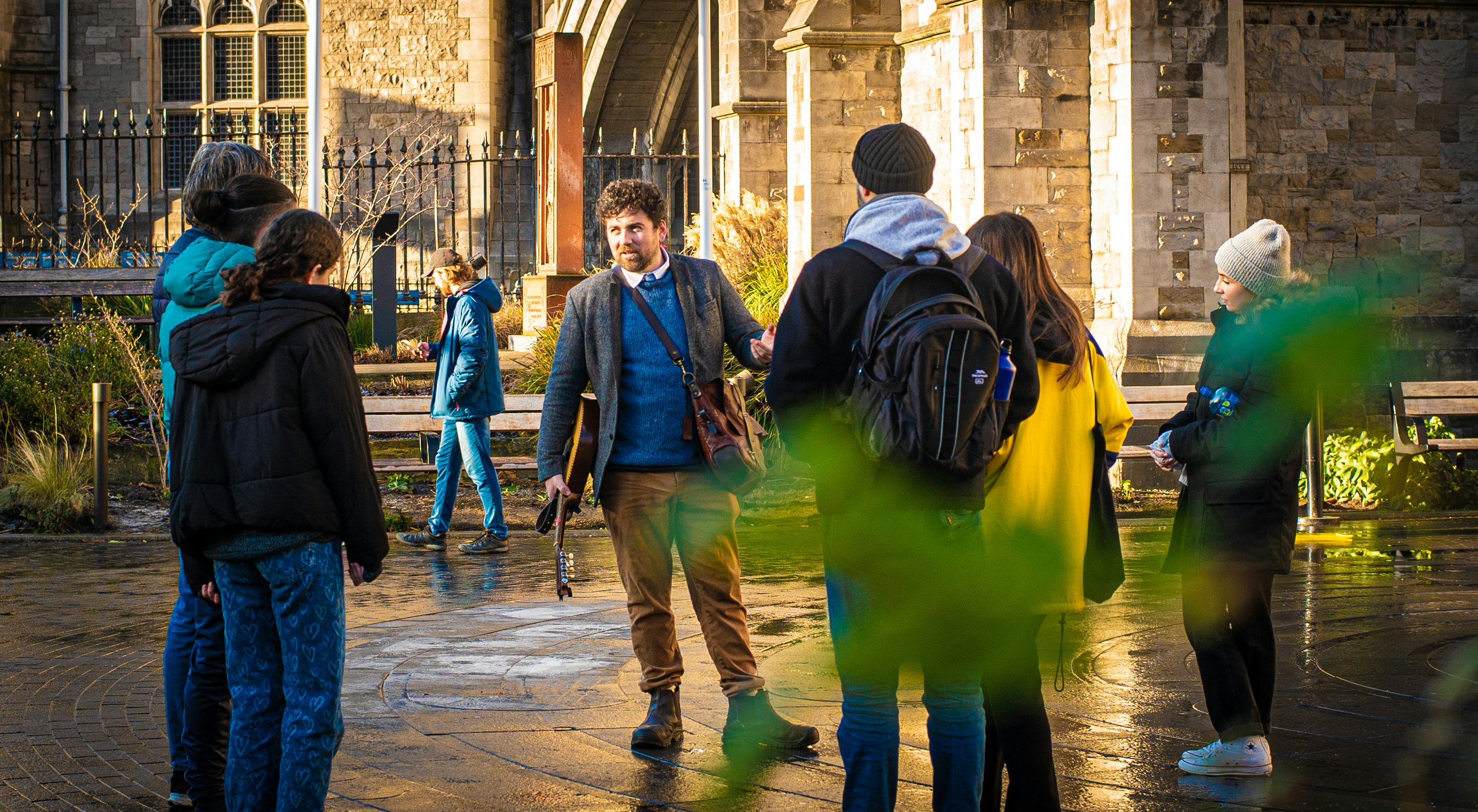
Many of his songs are so old they are not familiar to a local ear, so why does he choose these in lieu of more recognized Irish ballads?
“It’s more about broadening the tradition,” he explains. “I will sing a song that people know if they ask – but it’s more about shedding light and showing how vast the tradition is... The whole goal is to try and encourage people to create their own songs, and sing and dance.
“I want to try and – not demystify the process because it’s beautiful – but make it more accessible and show it can be done by everyone... If you can speak, you can sing. I think the X Factor–ification of singing and dancing has robbed people of their confidence and ownership of it. And the tour is all about claiming that back.”
Learning from the locals
Dublin Castle is the next stop. Constructed in the early 13th century on the site of a Viking settlement, it served as the seat of British rule in Ireland from 1204 until 1922. Seán points out original features as well as newer additions, much of which he’s learned about by talking with people in pubs and punters on the street. “I strike up conversations with strangers all the time,” he says. “I’ve learned so much.”
Such is the essence of Fitzgerald’s city knowledge. Animated by the wisdom of everyday Dubliners, he is offering a bold new take on folk ballads, extending their lifetime well past their mid-century golden age, and their influence well beyond the borders of the greater Dublin area.

“As far as I’m aware I’m the only one doing this sort of thing,” he says as the tour draws to a close. “It’s not that it’s hugely lucrative or anything, it just seems to me that these songs and people would just be forgotten about if we didn’t keep talking about them.
“And I just really don’t want to let that happen.”
Ballad Tours Dublin can be booked via , or by email (balladtoursdublin@gmail.com).

Plan with a local




